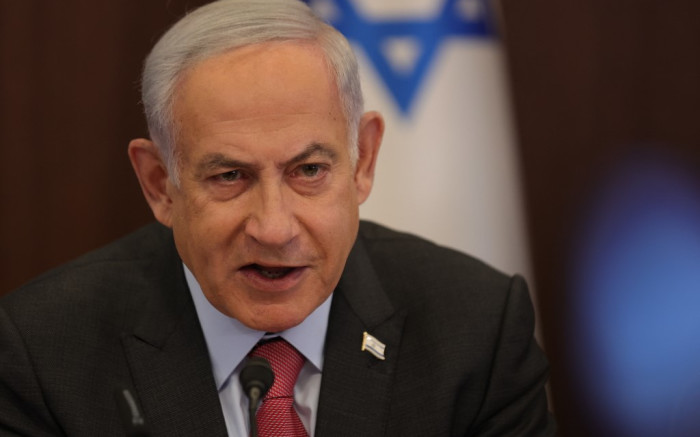
Relentless Israeli attacks have devastated Palestinian territory and the conflict has heightened tensions across the Middle East, with global pressure for a ceasefire increasing.
FILE: Israeli Prime Minister Benjamin Netanyahu. Image: AFP
JERUSALEM – Israeli Prime Minister Benjamin Netanyahu has insisted that peace in Gaza can only be achieved by destroying Hamas, demilitarizing the area and “deradicalising” Palestinian society, after warning that the war would intensify.
The statements came as the World Health Organization on Monday reported “harrowing” reports of entire families killed in Christmas Eve attacks at a refugee camp in Gaza.
Relentless Israeli attacks have devastated Palestinian territory and the conflict has heightened tensions across the Middle East, with global pressure for a ceasefire increasing.
But in a comment published in Wall Street Journal On Monday evening, Netanyahu promised to stay on course.
“Hamas must be destroyed, Gaza must be demilitarized and Palestinian society must be de-radicalized. These are the three conditions for peace between Israel and its Palestinian neighbors in Gaza,” Netanyahu said.
He said demilitarization would require “the establishment of a temporary security zone on the edge” of the territory.
“For the foreseeable future, Israel will have to retain overall security responsibility for Gaza,” he said.
Earlier on Monday, Netanyahu visited the Gaza Strip and told a meeting of his Likud party upon his return: “We will not stop.”
“We will intensify the fighting in the coming days,” he said, according to a party statement.
“SHOCKING ACCOUNTS”
The war in Gaza erupted when Palestinian militants broke through the militarized border on October 7 and attacked southern Israel, killing about 1,140 people, mostly civilians, according to an AFP tally based on Israeli figures.
According to Israeli sources, fighters also captured around 250 hostages.
In response, Israel pledged to crush Hamas and launched a retaliatory military campaign that included extensive airstrikes and a siege of the territory. At least 20,674 people, mostly women and children, were killed in the campaign, according to the Hamas-run Health Ministry in Gaza.
On Monday, some residents of Al-Maghazi refugee camp returned to the ruins of their homes following strikes the previous day that killed at least 70 people, according to Gaza’s health ministry. AFP was unable to independently verify this toll.
Zeyad Awad said there was no evacuation warning before the attacks.
“What should we do? We are civilians who live peacefully and only want security,” he said.
“Yet we are suddenly and without warning attacked by Israeli warplanes.”
WHO staff visited a hospital where victims of the Al Maghazi attacks were being treated.
“The team heard harrowing reports from health workers and victims,” U.N. health agency chief Tedros Adhanom Ghebreyesus said on social media.
“A child lost his entire family in the strike in the camp. A nurse at the hospital suffered the same loss,” he added.
Sean Casey, a WHO emergency response team coordinator who joined the mission at the hospital, described the fate of a nine-year-old being treated who was expected to die.
“He was crossing the street in front of the shelter where his family was staying and the building next to him exploded,” he said.
The Israeli army said it was “reviewing the incident,” adding that it was “committed to international law, including taking feasible steps to minimize harm to civilians.”
“REAL HUNGER”
Vast areas of Gaza are in ruins and its 2.4 million residents are suffering from severe shortages of water, food, fuel and medicine, which can only be alleviated by the limited arrival of aid trucks.
Dozens of Gazans held empty containers and waited for food distribution on a street in Rafah, southern Gaza.
“Now there is real hunger. My children are dying of hunger,” said one of them, Nour Ismail.
According to the United Nations, an estimated 1.9 million Gazans have been displaced, many of them fleeing south and being crammed into shelters or makeshift tents in the winter cold.
“A humanitarian ceasefire in Gaza is the only way forward,” said UN refugee agency chief Filippo Grandi.
At the Likud meeting on Monday, Netanyahu said he was ready to support the voluntary emigration of civilians from the Gaza Strip, the Israeli newspaper Haaretz reported.
He reportedly told party members: “Our problem is not whether we will allow a withdrawal, but that there will be countries willing to accept a withdrawal.”
Hamas dismissed any discussion of such a plan as “absurd.”
Palestinians “refuse to be deported and displaced. There can be no exile and there is no choice but to remain on our land,” it said in a statement.
“Free our hostages”
Netanyahu also spoke during a special session of parliament on Monday about the 129 hostages Israel says are still in the Gaza Strip. He was booed by families waiting for their loved ones to return after 80 days in captivity.
“Now!” Relatives chanted as Netanyahu said Israeli forces needed “more time” to increase military pressure on Hamas, which he said would help secure the release of prisoners.
The number of Israeli soldiers killed in Gaza has risen to 158, with an army spokesman announcing two more deaths early Tuesday morning.
Meanwhile, fears of a regional escalation only grew on Monday.
Iran’s Islamic Revolutionary Guard Corps said an Israeli airstrike in Syria killed Razi Mousavi, whom state media described as “one of the most experienced advisers” to the force’s foreign wing.
There was no immediate comment from Israel, which has stepped up attacks on targets in Syria since the start of the Israel-Hamas war.
Yemen’s Houthi rebels, also backed by Iran, have fired on cargo ships in the Red Sea, prompting the United States to set up a naval task force to fend off missile and drone attacks.






Recent Comments